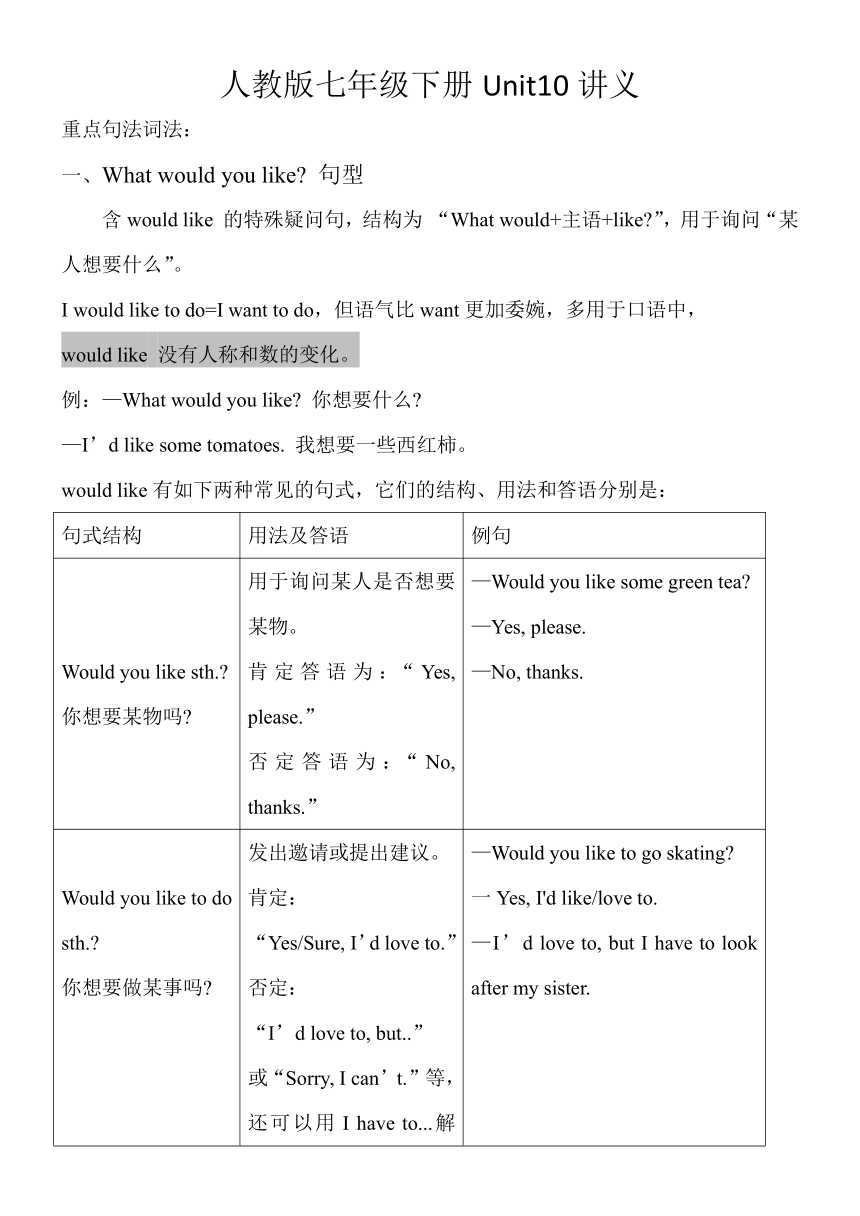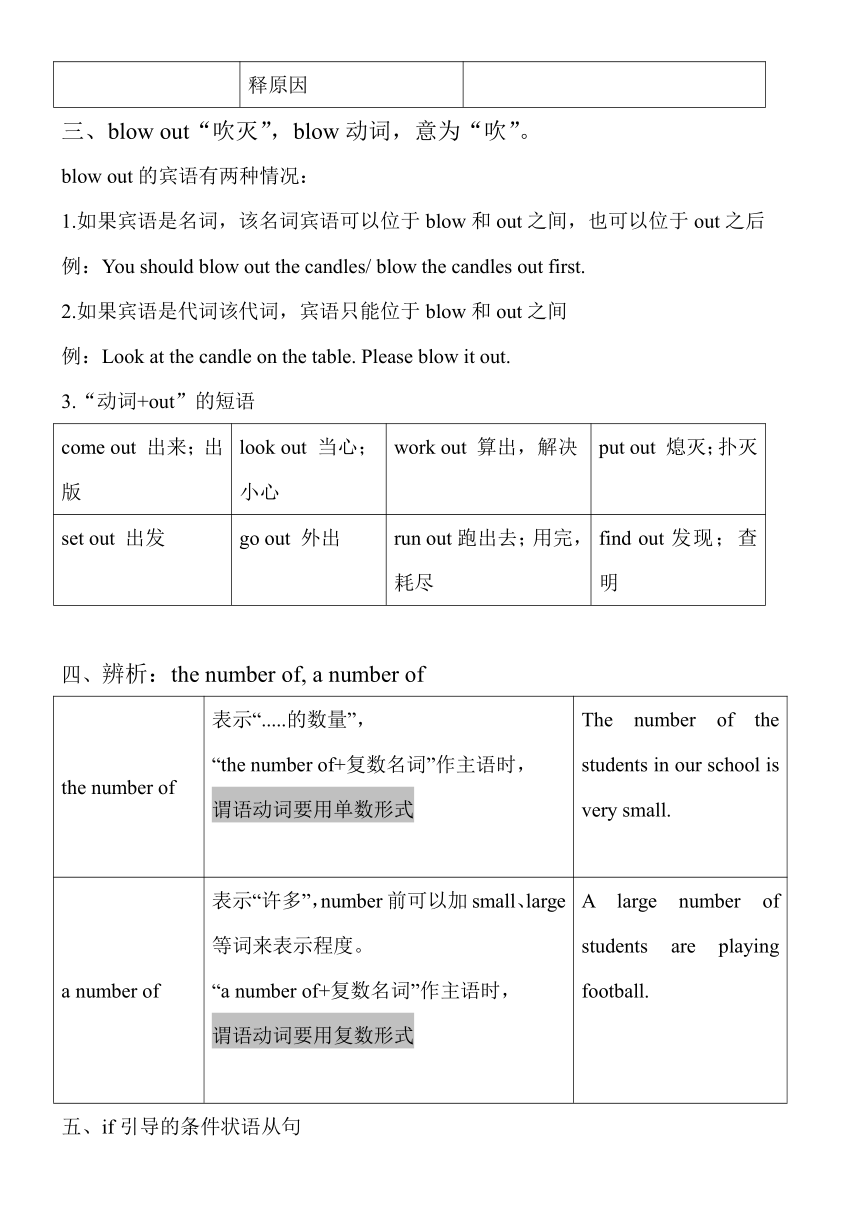人教版七年级下册Unit10讲义(重点词汇和语法知识点)
文档属性
| 名称 | 人教版七年级下册Unit10讲义(重点词汇和语法知识点) |  | |
| 格式 | docx | ||
| 文件大小 | 20.9KB | ||
| 资源类型 | 教案 | ||
| 版本资源 | 人教新目标(Go for it)版 | ||
| 科目 | 英语 | ||
| 更新时间 | 2023-06-03 20:29:36 | ||
图片预览


文档简介
人教版七年级下册Unit10讲义
重点句法词法:
一、What would you like 句型
含would like 的特殊疑问句,结构为 “What would+主语+like ”,用于询问“某人想要什么”。
I would like to do=I want to do,但语气比want更加委婉,多用于口语中,
would like 没有人称和数的变化。
例:—What would you like 你想要什么
—I’d like some tomatoes. 我想要一些西红柿。
would like有如下两种常见的句式,它们的结构、用法和答语分别是:
句式结构 用法及答语 例句
Would you like sth. 你想要某物吗 用于询问某人是否想要某物。 肯定答语为:“Yes, please.” 否定答语为:“No, thanks.” —Would you like some green tea —Yes, please. —No, thanks.
Would you like to do sth. 你想要做某事吗 发出邀请或提出建议。 肯定: “Yes/Sure, I’d love to.” 否定: “I’d love to, but..” 或“Sorry, I can’t.”等, 还可以用I have to...解释原因 —Would you like to go skating 一Yes, I'd like/love to. —I’d love to, but I have to look after my sister.
三、blow out“吹灭”,blow动词,意为“吹”。
blow out的宾语有两种情况:
1.如果宾语是名词,该名词宾语可以位于blow和out之间,也可以位于out之后
例:You should blow out the candles/ blow the candles out first.
2.如果宾语是代词该代词,宾语只能位于blow和out之间
例:Look at the candle on the table. Please blow it out.
3.“动词+out”的短语
come out 出来;出版 look out 当心;小心 work out 算出,解决 put out 熄灭;扑灭
set out 出发 go out 外出 run out跑出去;用完,耗尽 find out发现;查明
四、辨析:the number of, a number of
the number of 表示“.....的数量”, “the number of+复数名词”作主语时, 谓语动词要用单数形式 The number of the students in our school is very small.
a number of 表示“许多”,number前可以加small、large等词来表示程度。 “a number of+复数名词”作主语时, 谓语动词要用复数形式 A large number of students are playing football.
五、if引导的条件状语从句
if 是连词,引导条件状语从句。如果主句用一般将来时, if引导的从句用一般现在时。
例:If it rains tomorrow, I will stay at home. (主将从现)
六、可数名词和不可数名词
1.可数名词:可以以数目来计算的名词,有单数和复数之分。
2.名词单数变复数的变化规则
类别 构词方法 例词
一般情况 加 -s book -- books bag -- bags key -- keys
以x, s, ch, sh等结尾的词 加 -es class -- classes box -- boxes / watch -- watches dish -- dishes
以辅音字母加y结尾的单词 变y为i再加 -es family -- families party -- parties
以 o 结尾的名词 一般在词尾加“s”, 有生命加 “es” 无生命加 “s” zoo -- zoos photo -- photos potato -- potatoes tomato -- tomatoes
以 f或 fe 结尾的词 变f或 fe 为 ves leaf -- leaves knife -- knives life -- lives
不规则名词复数的变化
man --- men woman --- women child --- children
mouse --- mice tooth ---teeth foot --- feet
名词单复数形式一样
sheep --- sheep deer --- deer
fish --- fish Japanese --- Japanese Chinese --- Chinese
含有man woman修饰的复合名词词组,变复数时两个都要变为复数。
例:man teacher--- men teachers woman doctor--- women doctors
popular形容词,意为“受欢迎的;流行的”。
反义词:unpopular不受欢迎的
be popular with/ among... “在.....中很受欢迎”
其他用法
1.around the world=all over the world 世界各地
2.would like to do = want to do想要去做
3. take one’s order 准备点菜,其中order作名词,意为“点菜”
(还有n. v. 命令的意思)
4.one bowl of... 一碗
5. the number of... ...的数量 谓语动词用单数
a number of... 大量的 谓语动词用复数
6.make a wish 许愿
7.blow out the candles 吹灭蜡烛
8.what size什么尺寸
9.in one go=in one breath 一口气
10.what kind 什么种类 what time几点 what sport什么运动
what color/colour什么颜色 what club什么俱乐部
11.come true 实现
12.a small / medium / large bowl of 小/ 中/大碗
13.cut up 切碎
cut down 砍伐,砍倒
cut off 切掉,切断
cut in line 插队
cut out 剪下,裁剪;删除
14.another三者或三者以上的“另一”
15.each(of)“每一个”侧重个体,every“每一个”侧重总体each other“相互”
each 后跟可数名词单数
重点句法词法:
一、What would you like 句型
含would like 的特殊疑问句,结构为 “What would+主语+like ”,用于询问“某人想要什么”。
I would like to do=I want to do,但语气比want更加委婉,多用于口语中,
would like 没有人称和数的变化。
例:—What would you like 你想要什么
—I’d like some tomatoes. 我想要一些西红柿。
would like有如下两种常见的句式,它们的结构、用法和答语分别是:
句式结构 用法及答语 例句
Would you like sth. 你想要某物吗 用于询问某人是否想要某物。 肯定答语为:“Yes, please.” 否定答语为:“No, thanks.” —Would you like some green tea —Yes, please. —No, thanks.
Would you like to do sth. 你想要做某事吗 发出邀请或提出建议。 肯定: “Yes/Sure, I’d love to.” 否定: “I’d love to, but..” 或“Sorry, I can’t.”等, 还可以用I have to...解释原因 —Would you like to go skating 一Yes, I'd like/love to. —I’d love to, but I have to look after my sister.
三、blow out“吹灭”,blow动词,意为“吹”。
blow out的宾语有两种情况:
1.如果宾语是名词,该名词宾语可以位于blow和out之间,也可以位于out之后
例:You should blow out the candles/ blow the candles out first.
2.如果宾语是代词该代词,宾语只能位于blow和out之间
例:Look at the candle on the table. Please blow it out.
3.“动词+out”的短语
come out 出来;出版 look out 当心;小心 work out 算出,解决 put out 熄灭;扑灭
set out 出发 go out 外出 run out跑出去;用完,耗尽 find out发现;查明
四、辨析:the number of, a number of
the number of 表示“.....的数量”, “the number of+复数名词”作主语时, 谓语动词要用单数形式 The number of the students in our school is very small.
a number of 表示“许多”,number前可以加small、large等词来表示程度。 “a number of+复数名词”作主语时, 谓语动词要用复数形式 A large number of students are playing football.
五、if引导的条件状语从句
if 是连词,引导条件状语从句。如果主句用一般将来时, if引导的从句用一般现在时。
例:If it rains tomorrow, I will stay at home. (主将从现)
六、可数名词和不可数名词
1.可数名词:可以以数目来计算的名词,有单数和复数之分。
2.名词单数变复数的变化规则
类别 构词方法 例词
一般情况 加 -s book -- books bag -- bags key -- keys
以x, s, ch, sh等结尾的词 加 -es class -- classes box -- boxes / watch -- watches dish -- dishes
以辅音字母加y结尾的单词 变y为i再加 -es family -- families party -- parties
以 o 结尾的名词 一般在词尾加“s”, 有生命加 “es” 无生命加 “s” zoo -- zoos photo -- photos potato -- potatoes tomato -- tomatoes
以 f或 fe 结尾的词 变f或 fe 为 ves leaf -- leaves knife -- knives life -- lives
不规则名词复数的变化
man --- men woman --- women child --- children
mouse --- mice tooth ---teeth foot --- feet
名词单复数形式一样
sheep --- sheep deer --- deer
fish --- fish Japanese --- Japanese Chinese --- Chinese
含有man woman修饰的复合名词词组,变复数时两个都要变为复数。
例:man teacher--- men teachers woman doctor--- women doctors
popular形容词,意为“受欢迎的;流行的”。
反义词:unpopular不受欢迎的
be popular with/ among... “在.....中很受欢迎”
其他用法
1.around the world=all over the world 世界各地
2.would like to do = want to do想要去做
3. take one’s order 准备点菜,其中order作名词,意为“点菜”
(还有n. v. 命令的意思)
4.one bowl of... 一碗
5. the number of... ...的数量 谓语动词用单数
a number of... 大量的 谓语动词用复数
6.make a wish 许愿
7.blow out the candles 吹灭蜡烛
8.what size什么尺寸
9.in one go=in one breath 一口气
10.what kind 什么种类 what time几点 what sport什么运动
what color/colour什么颜色 what club什么俱乐部
11.come true 实现
12.a small / medium / large bowl of 小/ 中/大碗
13.cut up 切碎
cut down 砍伐,砍倒
cut off 切掉,切断
cut in line 插队
cut out 剪下,裁剪;删除
14.another三者或三者以上的“另一”
15.each(of)“每一个”侧重个体,every“每一个”侧重总体each other“相互”
each 后跟可数名词单数
同课章节目录
- Unit 1 Can you play the guitar?
- Section A
- Section B
- Unit 2 What time do you go to school?
- Section A
- Section B
- Unit 3 How do you get to school?
- Section A
- Section B
- Unit 4 Don't eat in class.
- Section A
- Section B
- Unit 5 Why do you like pandas?
- Section A
- Section B
- Unit 6 I'm watching TV.
- Section A
- Section B
- Review of Units 1-6
- Unit 7 It's raining!
- Section A
- Section B
- Unit 8 Is there a post office near here?
- Section A
- Section B
- Unit 9 What does he look like?
- Section A
- Section B
- Unit 10 I'd like some noodles.
- Section A
- Section B
- Unit 11 How was your school trip?
- Section A
- Section B
- Unit 12 What did you do last weekend?
- Section A
- Section B
